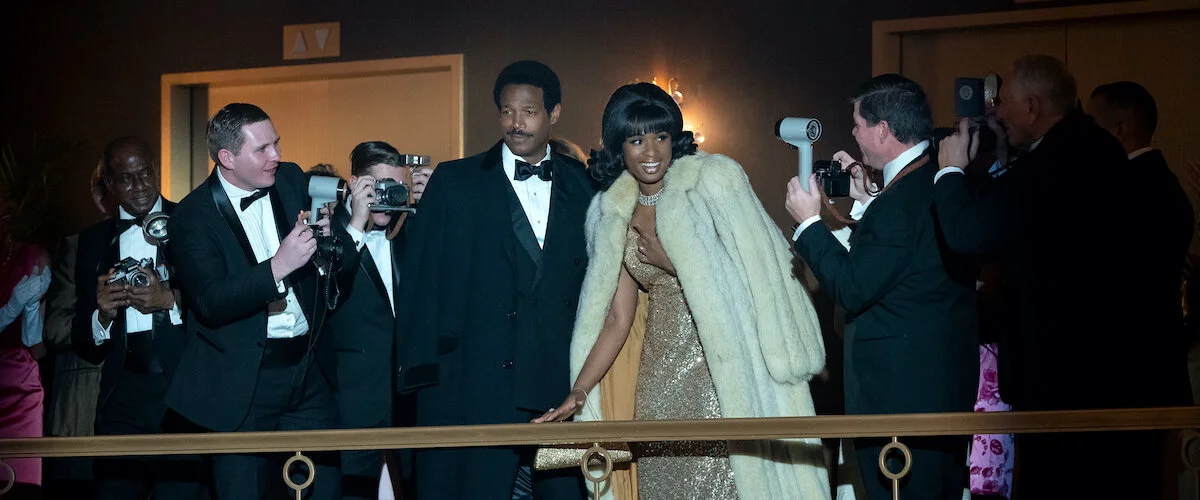RESPECT
Directing: B
Acting: A-
Writing: B
Cinematography: B
Editing: B
As always a biopic is tricky. How can you cram someone’s entire life into just two hours—or even, much more commonly these days, two and a half hours? It’s always better to take a particularly notable moment in someone’s life and make a movie out of that. Consider the fantastic 2006 film The Queen, which was about Queen Elizabeth II but narrowed the focus down to the aftermath of Princess Diana’s death. When it comes to biographical representation in film, the more specific, the better.
Respect attempts to have it both ways, ending its story at the time of Aretha Franklin’s career-high recording of the gospel album Amazing Grace in 1972. (There was an accompanying documentary film crew at that recording, but the film was not finished and released until 2018.) This leaves the last five decades of Ms. Franklin’s life untold—but, given that the film begins with her at age ten, it still crams the first thirty years of her life into a run time of 145 minutes. It’s still too much.
And granted, we all know Aretha Franklin easily earned her status as a legend, which means there’s a lot about her that’s worth telling. Some of it, Respect somewhat frustratingly glosses over, such as the shocking fact that she had her first child at the age of twelve, and her second at fourteen, with this film never making clear who the father was—she never told anyone who the father was. Some handwritten wills discovered in 2019 name someone as a father, about whom still little is known, but as they have evidently not been authenticated, Respect sidesteps offering any clarity on the matter.
Given the mystery surrounding the paternity of those first two children, this makes sense—but then, there’s also Ms. Franklin’s relationship with her minister father, C. L. Franklin (an excellent Forest Whitaker). First-time feature film director Liesel Tommy—with a script by Tracey Scott Wilson, both of them women of color—appropriately depicts this as a complicated relationship, but here also completely sidesteps the quite obvious question of how he handled his daughter getting pregnant so young, not just once but twice. We literally never see them even discuss it.
Instead, we see C. L. Frankling immediately hostile toward Ted White (Marlon Wayans), who would become Ms. Franklin’s first husband. White later fully warrants this hostility, but the film doesn’t give us any reason to understand its immediacy as soon as his introductory scene. All we know is that C. L. hates him and Aretha is plainly attracted to him.
And, it seems, Ms. Frankling had many complicated relationships, including with Ted White, who was evidently an overbearing manager. At least she seems to have a healthy relationship with music producer Jerry Wexler, who helped her finally record some hit records several years into her career. Wexler is played by Marc Maron, a comedian and longtime favorite podcast host of mine. These are the only things that make his performance especially notable, and appropriately so: Respect is a film that rightly centralizes the Black characters and, even with Wexler being by far the biggest part for a white person, even he is fundamentally decentralized in the story—as he should be. Knowing who he is, though, it’s nice to see Maron playing a part so well, especially one that is further from his real-life self than anything else he’s ever done.
In any case, I spent a fair amount of time in Respect tying to identify the “hook,” or the arc of Ms. Franklin’s story being told her, as it spans so many years. The film finally manages it after some time, and once it does, it’s easier to appreciate the film as a whole. And for those of us who did not already know a lot about Aretha Franklin, you learn some pretty interesting stuff, perhaps most notably that Martin Luther King Jr. (played by Gilbert Glenn Brown) was a family friend. Ms Franklin is credited in the film for helping Dr. King and his activism, although none of her activism or charity work is ever directly depicted.
Broadly speaking, there’s a slightly disappointing aspect to the telling of Ms. Franklin’s story here, ultimately coming across as vaguely bland. What helps Respect rise above its fairly standard biopic storytelling is the performances, by far most significantly Jennifer Hudson in the lead role. Her screen presence here is not quite as electrifying and urgent as her Oscar-winning turn in Dreamgirls (2006), but she still delivers a performance worthy of another Oscar nomination, and is doubly impressive once you know she sang live on set.
The supporting performers are uniformly excellent as well, from Forest Whitaker and Marlon Wayans to smaller but notable parts with Mary J. Blige as Dinah Washington and a nearly unrecognizable Tituss Burgess as Reverend Dr. James Cleveland. All of them are still pushed aside, of course, by the presence of Hudson as Ms. Franklin, who reportedly told Hudson she wanted her to play her in the movie. Franklin’s music is iconic, and Respect not only features plenty of it, but several scenes depicting how their arrangements came to be. The sequence in which she and her sisters come up with the hook for the song “Respect” is especially fun.
Beyond that, Respect has its ups and downs, just like the life of the person whose story it tells, and just like any decent biopic. And if this movie isn’t exactly a masterpiece, at least it’s decent, and features great music.
A woman on a bumpy road to self-possession.
Overall: B

